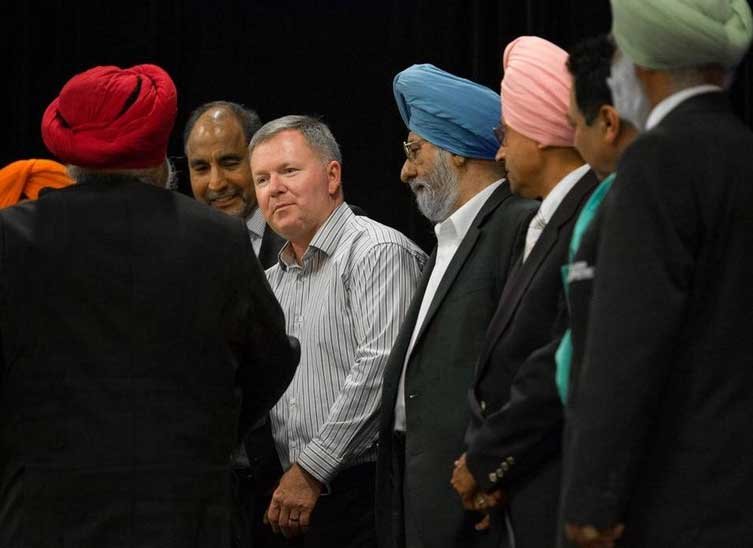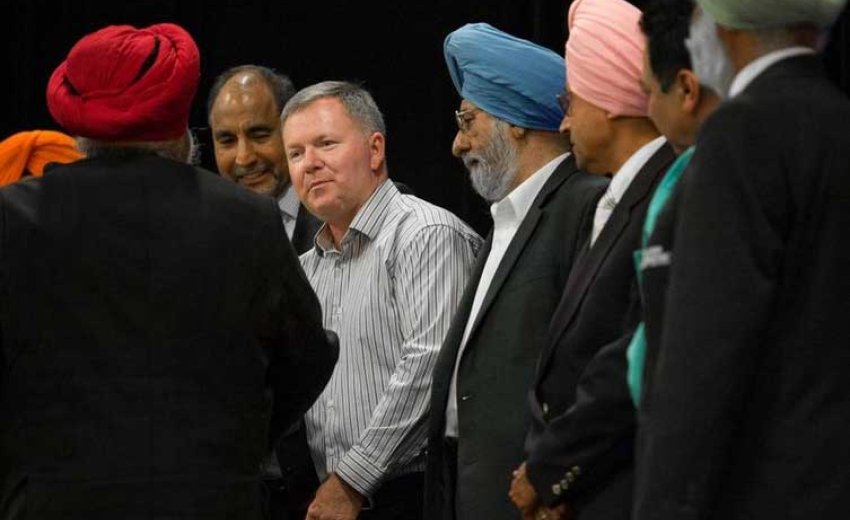
More than 10,000 Sikhs from Elk Grove to Yuba City this weekend came out to honor Lt. Brian Murphy, a retired cop they consider their American hero.
Murphy took 15 bullets battling a white supremacist who’d already massacred six worshippers and wounded three at the Sikh temple, or gurdwara, in Oak Creek, Wis., on Aug. 5, 2012.
The soft-spoken Murphy, his vocal cords still damaged from the bullet that cut through his larynx, has gone on to train dozens of officers nationwide about Sikhism, an often misunderstood religion he said shares a core belief with law enforcement: “to protect and serve.”
At a dinner in his honor in Elk Grove on Saturday night, Murphy said that while Sikh men – who wear beards and turbans as part of their faith – may look different, “once you find out what you have in common, the rest melts away.”
Murphy, 53, said he understands the immigrant experience because he’s the grandson of Irish and Scottish immigrants who taught him the values of hard work and public service.
“I don’t come from a lot,” he said. “My dad was a garbage man, my mom worked in a bank. We had a 2 1/2-bedroom house and at one point, we had 10 people living there.” Murphy, a former Marine who worked security at the U.S. Embassy in Kabul, said he comes from a long line of veterans and cops – a grandfather was a New York police captain. He joined the Oak Creek Police Department in 1991.
The morning of the attack, Murphy was supposed to be off but agreed to sub for a friend whose son was going into the military. “It was Murphy’s Law,” he quipped. When the call of a mass shooting at the Sikh temple came in at 10:25 a.m., Murphy drove to the scene without thinking twice “because that’s how my mother raised me. I grew up in Brooklyn, where one year I was the only white guy on the football team. Nobody cared what color your skin was.”
He recalled driving up the temple driveway and noticing two bodies on the ground. “When I was calling for an ambulance, I saw a guy coming out of the temple with a gun in his hand. I yelled at him to stop, and we both shot at the same time.” The gunman – U.S. Army special operations veteran Wade Michael Page – was a known white supremacist who played in a band called Definite Hate.
The first shot from Wade’s semi-automatic pistol hit Murphy in the chin and larynx. His second shot took off part of Murphy’s left thumb. As Murphy crawled to his squad car, Wade came after him, shooting him in the back of the head, arm and legs. Murphy lay bleeding on the ground telling himself, “I’m not going anywhere right now,” and after a minute and 51 seconds, as the gunman reloaded, Oak Creek Officer Sam Lenda arrived and shot Wade in the abdomen. Wade then shot himself in the head.
Oak Creek Police Chief John Edwards said Murphy waved off fellow police coming to his rescue and told them to help the other victims first.
“There were 15 women and children hiding in the pantry ... and if the gunman had got there first, it would have been like shooting fish in a barrel,” Murphy said.
Murphy, who has since retired from the Police Department, said what he’s learned from the Sikhs since the Oak Creek shooting “is invaluable. I remember waking up in the ICU, I couldn’t talk, and the first thing I saw was the president of the Sikh gurdwara on TV saying ‘we forgive the shooter.’ That was incredible.” Murphy is still going through physical therapy, but he said, “I’m alive for a reason.”
Awarded the the Public Safety Officer Medal of Valor – the nation’s highest award for law enforcement – at the White House in February, Murphy also was recognized by President Barack Obama in his 2013 State of the Union address.
The documentary, “Not In Our Town: Waking In Oak Creek,” chronicles how the city rallied behind the Sikhs and their fallen hero. The Oak Creek massacre “was the most deadly hate crime we’ve seen in our country in the past 50 years,” said the filmmaker, Patrice O’Neill. “I’ve seen Lt. Murphy speak all over the country, and the spiritual awakening you see happening is a gift to the world.”
Had Murphy not engaged the gunman, there’s no telling how many people might have died because many more Sikhs were due to arrive at the temple that morning, said Inderjit Singh Kallirai, the Sikh community leader who organized Saturday’s dinner. “The fact that he’s still alive shows us the value of faith and unity,” he said.
Murphy was also honored Sunday before 1,000 worshippers at the Sri Guru Nanak Temple in Yuba City, said community leader Karm Bains. “I feel indebted to this man,” Bains said. “There’s still a lot of racism and ignorance out there, but his being alive to teach others shows there’s something good that came out of this tragedy.”
Sunday afternoon, Murphy was honored before another 10,000 Sikhs at the annual Punjabi American Festival at the Sutter County Fairgrounds.
